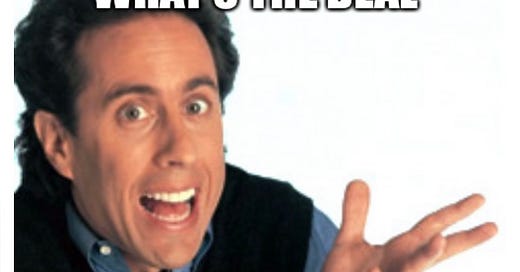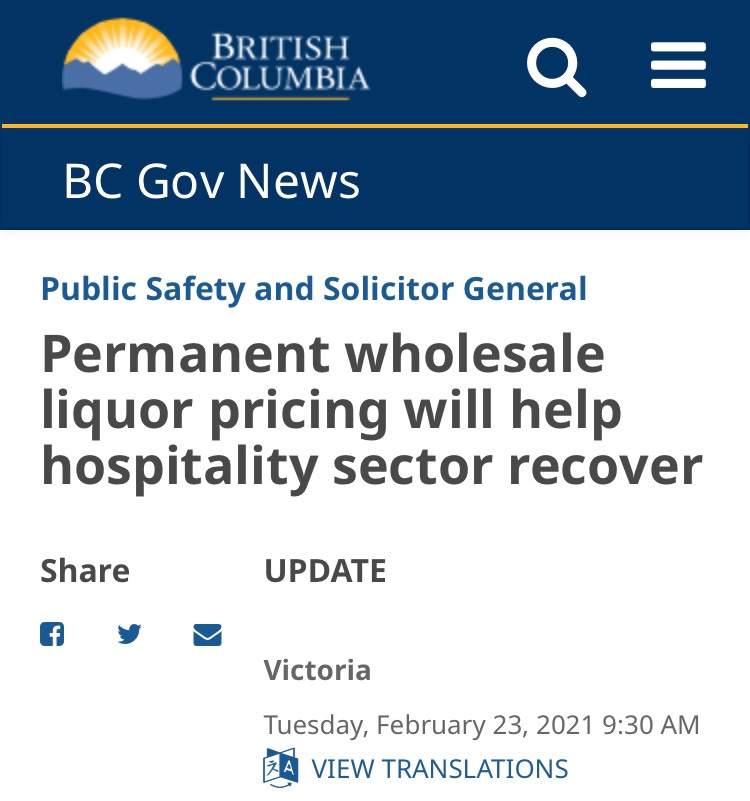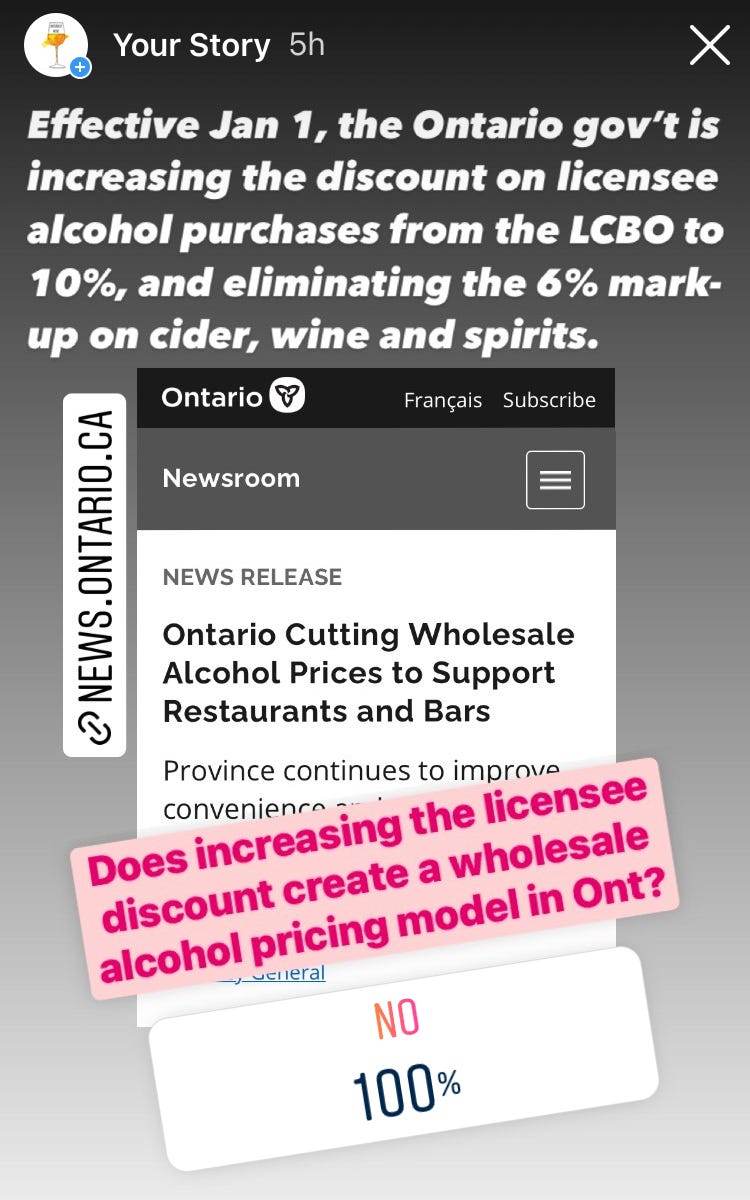What’s the Deal with Wholesale Pricing?
I know this seems very-inside-baseball, but if you’ve ever wondered why the price of a bottle of a wine at a restaurant is the price that it is, or why retail prices may be lower at some charming Paris wine shop, then it’s helpful to understand the alcohol retail model in your jurisdiction.
In Ontario, the distribution and retail sale of beverage alcohol is managed by the government through the LCBO. Restaurants and bars are required to purchase alcohol through the LCBO at about the same prices consumers pay. Other jurisdictions may have a less government controlled system, allowing restaurants and bottle shops to purchase from various distributors and importers directly, resulting in greater competition and flexibility, with overall wholesale prices less than retail.
Many groups have been calling for wholesale pricing for alcohol, including Restaurants Canada, the national industry association representing the food services sector; and the Federal Commissioner of Competition who wrote:
…a proper wholesale pricing system for Ontario bars and restaurants will encourage greater competition, which could lead to more product choice, lower prices, and new and innovative products for consumers.
Under the current pricing scheme for licensees, bars and restaurants do not benefit from proper wholesale pricing and must purchase from the Liquor Control Board of Ontario (LCBO) and the Beer Store at consumer-level retail prices. This drives up prices for consumers, as establishments must add a mark-up on the retail prices to generate a profit.
Ontario Government Announces Licensee Discount
On December 15, the Ontario government announced that licensees (ie. bars, restaurants, bottle shops) will receive a 10% discount on beverage alcohol purchased from the LCBO, effective January 1, 2022. The government is also eliminating a 6% mark-up on cider, wine and spirits.
The LCBO pricing structure is complex — and I’m no beverage alcohol retail model scientist — but there are fees, levies, mark-ups, and federal and provincial taxes. Currently, when bars and restaurants purchase from the LCBO, they receive a 5% discount, but are also charged a 6% mark-up, which means they pay about 1% more than you and I do. While the discount will be increased to 10%, the government’s news release says businesses will save “an effective 20 per cent,” explaining that “When combined with HST recovery and container deposit fees, these licensees will effectively pay 20 per cent less than retail prices…” That assumes beverage containers are returned, and also HST recovery applies to business expenses in most industries already. 🤔


Wholesale Pricing and Other Canadian Jurisdictions (👋 BC)
In April 2020, the drinks newsletter Moose Milk proposed wholesale pricing as a way to help bars and restaurants survive COVID-19:
It is a surprisingly little-known fact that drinking and eating establishments in this country pay the same prices as civilians do for alcoholic products… According to Restaurants Canada, only Alberta and PEI allow establishments to buy all types of alcohol at wholesale pricing.
A few months after that, British Columbia temporarily allowed BC restaurants and pubs to purchase alcohol wholesale as a pandemic measure; and in February 2021, the government announced that wholesale liquor pricing for hospitality licensees would be made permanent:
Temporary changes to allow for wholesale pricing for the hospitality industry were implemented June 2020 and set to expire March 31, 2021. Before that, hospitality licensees – including restaurants, pubs and tourism operators with liquor licences – paid full retail price (wholesale price, plus a retail markup set by the LDB) on most liquor purchases.
These changes permanently allow licensees to pay the wholesale price for the products they purchase, which is the same cost paid by government and private liquor stores in the province when they purchase stock for retail sale.
Instagram Polls and Other Media Articles and Responses
This newsletter’s Instagram conducted a very unscientific poll asking its followers if increasing the licensee discount creates a wholesale alcohol pricing model in Ontario, and the very unscientific results indicate no, it does not.
Now that we sort-of-kind-of understand a bit more about wholesale alcohol pricing, it’s important to note there is a distinction between that and a licensee discount. In Christine Sismondo’s December 11, 2020 Globe and Mail opinion piece, If governments really want to save bars and restaurants, they should throw an alcohol lifeline, she makes the case for why those businesses should pay less for alcohol. But Sismondo also wrote that Ontario may not be able to easily switch to a wholesale pricing system:
Ontario’s current system isn’t set up to easily switch to wholesale pricing, which is why some in the industry have been lobbying for a licensee discount instead…. The exact model may need fine-tuning, but the point is simple – if we think restaurants and bars add to our society and culture, they should be supported by paying less on alcohol than you or me…. In fact, licensees should be treated like partners….
So like the title of this great movie, It’s Complicated.
The Toronto Star’s Restaurants and bars to get a 10% break on liquor prices — but the price you pay may not drop quoted Tomas Morana of Bar Volo who said: “It’s a bit of help for an industry which has really been suffering these last two years, and it’s an overdue change in modernizing Ontario’s alcohol sales.”
WineAlign’s David Lawrason wrote that “It has taken the hardship of the pandemic to finally move the needle, with politicians pronouncing it is being done to help the devastated hospitality industry.”
And Tony Elenis, CEO of the Ontario Restaurant Hotel and Motel Association, supported the move saying “How can a licensed industry, which buys so much in volume, pay the same price as a consumer...everything else this industry buys, gets a discount, except beverage alcohol prices, it's unheard of,” according to CBC’s article Ontario to reduce wholesale alcohol prices for bars and restaurants.





